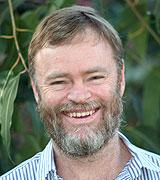Posted 3 July 2008

Professor Richard Kingsford
The NSW Government's new draft floodplain harvesting policy is a welcome start in managing the diversion of water from the floodplains of the State's rivers, but implementing it will present considerable challenges, says a leading UNSW environmental scientist.
The policy aims to license all NSW floodplain harvesting works - such as levees, channels, modified billabongs and depressions and storages - and it is intended to include a set of rules in water management plans to cover how water is diverted from the floodplain and in what volumes.
"This will mean that we will at last get more of an idea of what has been happening to our rivers when they overflow their banks," says Professor Kingsford. "It will at least provide a framework for approaching the problem, which we have not had up until now.
"But there will be considerable challenges in implementation. We know very little about the locations of all these structures on any of the floodplains, apart from the Macquarie River, and measuring how much water they divert will be particularly difficult."
Professor Kingsford was an author of a major study released earlier this year, which identified more than 2,000 km of levee banks, channels and storages on the floodplains of the internationally listed Macquarie Marshes wetlands. Most were developed in recent times and the combination of reduced flows as a result of river regulation and the cutting off of flows by channels and levees has had considerable impact on floodplain trees, killing many hectares. (See report here: http://www.connectedwaters.unsw.edu.au/news/floodplain.html).
The new policy appears to be silent on the management of those structures currently diverting environmental flows, he says: "Some channels and levee banks on the floodplain are capable of diverting into private storages any environmental flows released into rivers with water bought by the Federal or NSW Government on the open market. It is not clear how this policy deals with this issue."
The policy is designed to be consistent with the Murray-Darling Basin Cap and volumes of water will be determined by a Long-Term Average Extraction Limit. Professor Kingsford believes that this implementation detail is critical: "This is particularly important. If this policy truly respects the Murray-Darling Basin Cap, then the NSW Government will need to determine which structures should be removed or altered so that they meet the levels of development in 1994."
Given the complexity of the issue and the fact that no governments have tackled the problem of managing overland flows on Australia's rivers, the new policy is a good first step in the management of this issue.
Professor Kingsford said: "The capturing of overland flows is a basin-wide issue across the Murray-Darling. It is important that these new policy directions are applied everywhere. It will be particularly important for the last free-flowing river in the Murray-Darling Basin - the Paroo River - as it will ensure that no unauthorized banks or channels can be constructed and deny flows to the environment or river communities."
Links:

Professor Andy Baker features in American Water Resources Association ‘Water Resources Impact’, September 2020 edition.

The Connected Waters Initiative (CWI) is pleased to welcome Taylor Coyne to its network as a postgraduate researcher. If you’re engaged in research at a postgraduate level, and you’re interested in joining the CWI network, get in touch! The CWI network includes multidisciplinary researchers across the Schools of Engineering, Sciences, Humanities and Languages and Law.

The Grand Challenge on Rapid Urbanisation will establish Think Deep Australia, led by Dr Marilu Melo Zurita, to explore how we can use our urban underground spaces for community benefit.

On the 21 August 2020, CWI researchers made a submission to the National Water Reform Inquiry, identifying priority areas and making a number of recommendations as to how to achieve a sustainable groundwater future for Australia.

Results published from a research project between the Land Development Department (LDD) Thailand and UNSW has demonstrated how 2-dimensional mapping can be used to understand soil salinity adjacent to a earthen canal in north east Thailand (Khongnawang et al. 2020).